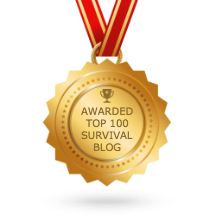Why You Should Prepare
Preparing for an emergency situation is often overlooked in the fast pace of modern life and there are many reasons to consider having at least a weeks worth of emergency supplies so that you and your family can survive until help arrives.
Most people take emergency responders for granted, not that they don't value their services, but that it is assumed that they will be there when needed; this is not always the case.
In the event of a large scale emergency, first responders and their resources will be quickly exhausted thanks to a sudden increase in demand.
First responders often become victims of disasters as their vehicles and equipment are often rendered useless until roads and debris are cleared.
Depending on the scale of the disaster it could take several days for outside emergency crews to respond from neighboring towns or states. (During Hurricane Katrina Helicopter Rescue Crews responded as from as far away as Kodiak, Alaska)
Budgeting constraints often leave local emergency services woefully understaffed and under equipped for average duty, let alone during a catastrophe.
Many people don't realize that they need to prepare for an emergency because they don't live in areas traditionally affected by natural disasters but there are literally hundreds of disaster scenarios that can occur anywhere and at anytime.
Possible Scenarios You May Not Have Considered:
Severe Seasonal Flooding
A prolonged mass power outage
Severe winter storms that shut down roadways
Prolonged public utility outages
Water shortages due to drought or contamination
Terrorist attacks involving Chemical Biological Radiological or Nuclear weapons
Naturally occurring epidemic
Wild fires
Food supply contamination (ie: E.coli or salmonella)
Despite the fact that many disasters can occur anywhere and at anytime, many people simply refuse to submit to reality and ready themselves for an emergency situation. Let's take a look at some of the reasons that people do not prepare.
Why People Don't Prepare
The most common reason that people don't prepare for a disaster scenario is that they don't think it could happen to them. This is an absolute falsehood and simple psychology plays a major factor into this phenomenon.
One of the problems that contributed to the horrific aftermath of Hurricane Katrina was that the previous year a large hurricane had hit the Gulf Coast and had very little effect. Many people decided to ride out Katrina under the assumption that it would be as harmless as the previous storm; tragically this was not the case.
People's brains are hard wired to assume that nothing devastating will ever happen to them because most disaster scenarios are extremely different from their normal experience.
In order to successfully prepare for a disaster we must discard this way of thinking and really on hard facts, data, and science. We must also change the societal stigma associated with disaster preparedness.
Many people associate disaster preparedness tactics, like food storing, to be the past-time of the paranoid militia types; this couldn't be further from the truth.
Non-partisan organizations like the Federal Emergency Management Agency and the Red Cross suggest that everyone have several supplies set aside for emergencies.
Being prepared is neither a Boy Scout motto nor a paranoid slogan, but rather an intelligent decision taken by individuals looking out for their own well being and the well being of their families.
Mark R. Seme studied political science in college, is a veteran of several campaigns, and is a life long student of politics. In 2011 Mark founded the website Saturday Night Politics, a political commentary site that takes the spin out of politics by focusing on pragmatism instead of partisanship.
SNP on Facebook: https://www.facebook.com/pages/Saturday-Night-Politics/194650163906116
SNP homepage: http://saturdaynightpolitics.com/blog/
Article Source: http://EzineArticles.com/6635240
The Prepper's Pocket Guide: 101 Easy Things You Can Do to Ready Your Home for a Disaster
120 Serving Breakfast Only @ $198 (120 Servings breakfast assortment. No entrees) - Order Now!




0 comments:
Post a Comment